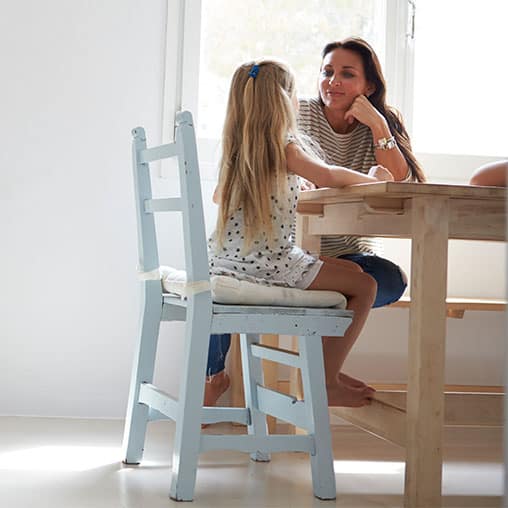
Being Intentional With Your Kids
Siblings Jessica Thompson and Joel Fitzpatrick, both married with children, know the challenge parents face of talking to our kids about sex. They also know that the culture we're in requires that we intentionally educate them. Jessica remembers how she responded the time her 7-year-old daughter asked her about sex during a Walmart run, and Joel shares how he uses ordinary activities, like taking a walk or driving in the car, to talk about the birds and the bees with his kids.
Show Notes
About the Host
About the Guest
-
- Mom, Dad...What's Sex? by Jessica Thompson and Joel Fitzpatrick
- FamilyLife’s Art of Parenting™ video series
-
Dave and Ann Wilson
Dave and Ann Wilson are hosts of FamilyLife Today®, FamilyLife’s nationally-syndicated radio program. Dave and Ann have been married for more than 38 years and have spent the last 33 teaching and mentoring couples and parents across the country. They have been featured speakers at FamilyLife’s Weekend to Remember® marriage getaway since 1993 and have also hosted their own marriage conferences across the country. Cofounders of Kensington Church—a national, multicampus church that hosts more than 14,000 visitors every weekend—the Wilsons are the creative force behind DVD teaching series Rock Your Marriage and The Survival Guide To Parenting, as well as authors of the recently released book Vertical Marriage (Zondervan, 2019). Dave is a graduate of the International School of Theology, where he received a Master of Divinity degree. A Ball State University Hall of Fame quarterback, Dave served the Detroit Lions as chaplain for 33 years. Ann attended the University of Kentucky. She has been active alongside Dave in ministry as a speaker, writer, small-group leader, and mentor to countless wives of professional athletes. The Wilsons live in the Detroit area. They have three grown sons, CJ, Austin, and Cody, three daughters-in-law, and a growing number of grandchildren.
-

Jessica Thompson
JESSICA THOMPSON is an author of several books including Give Them Grace: Dazzling Your Kids with the Love of Christ and frequent conference speaker. She is part of the podcast Front Porch with the Fitzes, and is the director of church life at RISEN Church in San Diego, California.
Joel Fitzpatrick
Joel Fitzpatrick has served as an ordained minister in the Presbyterian Church in America with a focus on youth and family. He received his MDiv from Westminster Seminary California. He is the co-author of Mom, Dad . . . What’s Sex? and contributed chapters to The Sinner and Saints Devotional: 60 days in the Psalms. Fitzpatrick lives in Southern California with his wife and their two children.
Siblings Jessica Thompson and Joel Fitzpatrick know the challenge parents face of talking to our kids about sex. They also know that the culture we’re in requires that we intentionally educate them.
Being Intentional With Your Kids
Bob: In case you haven’t noticed, our culture is talking regularly/loudly about sex. Jessica Thompson says our children are very aware of that.
Jessica: We’re not in an age anymore, where we can just sit back and not talk to our kids about these things. Everyone at school is talking about them; it’s a frequent conversation. We have to be involved; we have to be proactive with our children in this conversation. The good thing is—that’s not just a one-time conversation you have with your kids.
Bob: This is FamilyLife Today for Monday, April 8th. Our hosts are Dave and Ann Wilson; I'm Bob Lepine. Do you think your kids are ready to hear about sex? Ready or not, that conversation is happening. The question is: “Are you a part of it?” Stay with us.
And welcome to FamilyLife Today. Thanks for joining us. Because we have this shared love of old music, do you know the song that was a hit song—
Dave: You’re going to start with this?—you’re going to make me look like a fool. [Laughter]
Bob: No; no! I just want to see if you can name—because I actually had this as a 45. You remember 45s; right?
Dave: Oh, yes!
Bob: I had the 45 of a song by a one-hit wonder—a guy by the name of Jewel Akens. Do you have any idea what was his one big hit?—Jewel Akens.
Dave: Ann, do you know?
Ann: No.
Dave: I have no idea.
Bob: You will recognize it as soon as I start singing.
Dave: I’m sure. You’re going to sing it?
Bob: I’m going to sing it.
Ann: Oh, sing it, Bob!
Dave: Alright; you want a beat?
Bob: [Singing] “Let me tell you ‘bout—
Dave and Ann with Bob: —“the birds and the bees and the flowers and the trees—[Laughter and mumbling].
Dave: Nobody knows the rest of it. [Laughter]
Bob: That’s about as far as we get.
Dave and Ann: —“and the thing called looove.” [Laughter]
Bob: You know why I brought that up; right?
Dave: Ah, there you go!
Bob: I brought that up because we’re going to be talking about the birds and the bees—not the flowers and the trees. We are going to be talking about, as parents, how we engage our kids on this subject.
Did you have any classic Wilson moments on this subject with your boys?
Dave: Yes; it’s sort of interesting—my oldest is 32, and he was number one. I was the dad; and it was like, “I’m going to do this right.” I never had my dad talk to me about it—or my mom—so I’m going to do this. I planned this little trip. I think he was—I thought he was ten years old; right? We had this little talk, out in this field, where I—anyway, five or six years ago, I remember asking, “Hey, CJ; do you remember that talk we had?” He goes: “Dad! I was like six.” I was way too early. [Laughter] I don’t remember a thing—it was just so weird and awkward.” I’m like, “You were not six.” He goes, “Yes; I was.” I say, “Okay”; so I sort of overdid it there. I got it better with the other two.
Ann: Okay; so I guess these are bad parenting moments, because our youngest son is 27. [Laughter] He came up to me the other day and he said, “You know how you thought you were so open and talking to us about sex and stuff?” I’m like, “Yes,”—you know, I’m like, “He’s going to thank me.” And he goes: “It was way overboard. [Laughter] It was embarrassing the whole time, mom!” [Laughter]
Bob: Well, we’re going to see if we can fix the two of you, although it’s a little too late to get you fixed. [Laughter]
Dave: It’s too late, Bob.
Ann: Are you saying we need help? [Laughter]
Bob: We have brought in the experts to address this—Jessica Thompson and Joel Fitzpatrick are joining us on FamilyLife Today. Guys—welcome!
Joel: Thank you.
Bob: You are brother and sister. Our listeners will recognize Jessica from being on FamilyLife Today in the past with her mom, Elyse Fitzpatrick—your mom—[addressing Joel as well]—Elyse Fitzpatrick.
Joel: Yes.
Bob: You guys have, together, as brother and sister—
Joel: Yes; totally awkward.
Bob: —you’re written a book called Mom, Dad…What’s Sex?: Giving Your Kids a Gospel-Centered View of Sex in Our Culture.
Joel, “Why? Why this book; and why the two of you, together, as brother and sister?”
Joel: Yes; I mean, so on the one hand, it’s completely self-serving; because I just needed someone else’s name to put on my book. [Laughter]
Bob: —someone who’s sold books before!
Joel: Right; right!—someone who’s sold books before. And I couldn’t do that with my mom, because that wouldbe really awkward.
Both Jessica and I have kids, who were raised through the public school system—same public school system—we live near each other. Both our kids are asking the same sorts of questions: “What is—we have friends who say they are bi-sexual,” “…who say they are gay,” “…lesbian,”—like: “How do we work with that?”
Me—being a youth pastor at the time—I had just gotten done teaching about a 16-week class on this topic.
Bob: Sixteen weeks!!
Ann: Ohh!
Joel: The class was based off of questions that the kids had asked. I just said: “Look, you guys lead this class. You tell me, and I’m going to bring to you what the Bible says about this topic.”
Then, I went to Jessica and said: “Hey, look; like we’re both struggling with these conversations—like: ‘How do we do this well? How do we do this in light of the gospel?’” That produced this book.
Bob: Just as you were talking about it, I was thinking about, when our kids were little, my boys and girls were not coming home, saying: “Dad, what’s lesbianism?” “What’s bi-sexuality?” You don’t remember having those conversations; do you?
Dave: Never—never had a conversation.
Bob: But today—
Dave: Yes.
Bob: —it could be your fifth-grader, who says, “What does it mean to be gay?”
Jessica: Actually, my sixth-grader did come home, her first week in middle school, and said to me, “I met my first transgender person today.”
Bob: Wow!
Jessica: Sixth grade. I don’t know if that’s different because of where we live. We’re in Southern California—it might be a little bit different—the culture might be a little different there.
We’re not in an age anymore, where we can sit back and not talk to our kids about these things. Everyone at school is talking about them; it’s a frequent conversation. We have to be involved; we have to be proactive with our children in this conversation.
Bob: Not only is everybody talking about it, but there is a dominant stream of thinking, where your kids are—not just being engaged: “Hey, what do you think?” “What do you think?”—it’s like: “What should we think?” “What’s the right way to think?”
Ann: Yes; there are so many opinions.
Bob: Well, and the right way to think runs contra to what the Bible says is the right way for us to think about this.
I remember one guest we had on FamilyLife Today, who said, “My middle school daughter came home and said, “Can I put a rainbow thing across my Facebook® profile?” The mom asked, “Well, why do you want to do that?” She said, “Because if I don’t, I’m the only one in my class that doesn’t have that.”
Joel: Yes.
Bob: It wasn’t a question of: “Do I believe this or not?”—it’s a question of: “Will I be accepted in my age group if I don’t buy into the cultural thinking?”
Joel: Right; my daughter came home and told me that, in their world history class, they were having a debate over the topic of abortion. She was the only kid in the class who stood up and said anything about babies being human beings and arguing for a pro-life stance.
I think that the culture is definitely taking a shift; and it’s not good enough for us, as parents—there’s a little thing called the internet. If we’re not going to talk about it, our kids are going to go on; and they are going to google: “Homosexuality,” “Gay,” “Transgender,” “Lesbian.” The things that they’re going to see aren’t going to be what we would consider a good, nuanced, healthy way of looking at those issues.
Ann: The fact that your kids have already come to you—and are asking you these questions and talking to you about it—says, to me, you have been talking to them about this for quite a while. How did that start?
Jessica: I know for me, my daughter—she was probably seven years old—and we were walking through Walmart®. She asked me about sex. It was important for her to talk to me, right then. Maybe, she felt comfortable then; she was willing to listen then. When you have your kid’s ear—no matter what’s going on—that’s the time you talk about it.
Bob: So, what was your answer to that question, “What’s sex?” That’s a pretty big question.
Jessica: It was!—yes. I mean, I started—I think I asked her, “Well, what do you mean by ‘What is sex?’”—right?—like: “What are you getting at?—like the mechanics of it all?—or are you getting at some bigger picture?” I started asking her clarifying questions: “What do you mean by ‘What is sex?’”—you know, stuff like: “Where have you heard…?”—those types of questions.
Then, it got narrowed down to really what she was asking me. It was more of a mechanical question—we just started talking about it. You know, I told her what was age-appropriate for her to know at that point.
The good thing is—this is not a one-time conversation. This conversation—as you have this with your child, it always ends with you saying: “Lets talk about this again. Anytime you have questions, lets talk about this again. This is an open door, always. There’s no question that’s wrong. There’s no question that may seem too shameful or off limits. This is always an open door. I’m always willing to talk to you about it.”
Dave: I’m the parent that doesn’t have a seven-year-old daughter or son ask me a question. When do I bring this up?
Joel: Yes; that’s more my story. My kids didn’t ask the question, right off the bat. But what I did was—I’d just go out on walks with them. I’d ask them about their friends; I’d ask them about their day. Then, just naturally, I’d say: “Hey, I know that this is what’s going on in your school. I know you’re coming up on this class...Let’s talk about this some,—
Dave: That’s okay?
Joel: —“and is it okay for us to talk about this right now?”
Ann: So you ask them, “Is it okay?”
Joel: Yes; really, what that does—
Dave: I was going to say, “It’s a big jump for some parents.”
Joel: Yes; absolutely!
Dave: You know, we’re talking about the day; we’re talking sports, and class, and school; and “Now, lets talk about your private parts.” [Laughter] How do you do that?
Joel: Yes; I mean, there’s never not a time when it’s not awkward to start having those conversations. For me, I just had to do it; right? It’s one of these conversations, where you know it is going to be awkward, going into it. I think I, literally, said to my kids—to both of them, as I was talking to them, at different times: “This is going to be awkward. If this is too awkward for us to talk about right now, then that’s totally fine; but we do need to have this conversation at some point. We can talk it now, or talk about it tomorrow, or the next day or the next week; but we need to start having this conversation.”
Ann: At what age is that when that should start happening?
Joel: Yes; for my son, that was right around seven.
Jessica: I think as soon as your kids start asking questions or showing any interest. And maybe, they are not even saying it; but you see the look in their eye. I think that’s when you start having the conversations. We are not—again, we are not afforded the luxury, in this day and age, to wait.
Joel: Yes; and also, we aren’t afforded the luxury of just giving like vague details and saying, “Stay away from this, because it’s bad,” anymore; because they have a culture that will come to them and say: “No,”—actually, like—“sexual expression/sexual identity—that is who you are, as a human being, and to deny that means that you are denying your humanity.”
We have to do a far better job than just saying, “No.” We have to actually hold out for them something that is beautiful, so they are actually drawn to that beautiful picture.
Ann: It’s so interesting because even, as a young woman, I remember hearing people say, “You shouldn’t have sex before you’re married.” I thought: “Why? That’s the dumbest thing ever,” and no one ever said why—like: “What are the dangers of that?—why?”
I just thought, when Dave and I got married, I felt, “People need to share with kids the whys behind their answers.”
Jessica: Absolutely! That starts with building, “Why did God even create it?”—right? It’s not just: “Don’t have sex,”—that’s not our answer. Our answer is never just “Don’t do that!” “There’s a reason why God created sex. There’s a reason that He made us bodies to be able to enjoy it”; right?
Even if we give them a pat answer like, “If you have sex before you’re married, it could ruin your sex life when your married.” There’s so much more; this is a more robust topic than just that. I think that, as we give our kids this bigger picture—and as we teach them, even, enjoyment is not the end-all in this—“There’s a bigger picture of finding pleasure in Christ and what He says about you,” that I think is the end-all in this.
Bob: I think one of the key things we are hearing in this conversation is: “Moms and dads need to be purposeful/intentional—not reactive—but proactive. You got to have a strategy for this. If you’re thinking, “Well, yes; we’ll have a strategy when they become teenagers,” you have lost the game at that point; right?
You, as parents, have got to sit down with a game plan to say: “When they’re pre-school, we’re going to have these kinds of conversations,” “When they’re headed off to school, we’re going to have to shift it to these kinds of conversations…” “We’re going to do it regularly; we’re going to do it candidly. We’re going to do it in what’s appropriate language…”
It can’t just be mechanics and prohibitions; because I think that’s—a lot of parents would say: “Here’s how it works. Here’s what you don’t do…” “We’re done!
Everyone: Right.
Bob: “We’ve handled the issue”; right?
Dave: I can remember—my oldest son was maybe 11 and so that’s means—I have to ask my wife—my second son was nine?
Ann: Nine.
Dave: And Cody was six. We’re walking through a mall, just me and the boys. I see, up in front of us, a magazine rack, that was like waist level—it was low.
Joel: Yes.
Dave: And from a distance—maybe ten/fifteen yards away—I can see a Sports Illustrated swimsuit model on the cover of this thing. I’m, literally, like, “I’ve got to watch my boys to see if they even notice it.” Here’s what I noticed—my oldest saw it; the other two?—they didn’t even know it existed.
Joel: Right; right.
Dave: I say to CJ—I said—it was classic—I say: “Hey, did you see that magazine rack over there?” “No.” I said, “Well, I did.” He goes, “Oh, yes; well, I did too.” I go, “Did you see that girl in a bathing suit?” He goes, “No.” I go, “Well, I did.” He goes: “Oh, well, yeah. I might’ve seen it too.” I go, “Well, did you want to look at it?” He said, “No; I didn’t want to look at it, Dad”; because he knew—he’s probably thinking, “I shouldn’t.” I said, “Well, I wanted to look at it,” and I said: “There’s going to be things like that all around.” I said, “I don’t look at that, because I only want to look at your mom like that.”
I remember this—and he’s 11—I said: “But there’s nothing wrong with desiring to look at a pretty woman dressed like that.
Ann: Absolutely!
Dave: “I just wanted to tell you something,”—I remember using the term, I think, I heard it from FamilyLife®—I said: “It’s like drinking sewer water. You have to very careful; it can really be harmful.” I almost had this bond, with the 11-year-old—like: “As men, let’s win this thing.”
Is it that kind of stuff going on?
Joel: First of all, I think that it’s important to say that, if your kids are teenagers and you haven’t had this conversation, that doesn’t mean that their life is over. It doesn’t mean that you are a failure, as a parent. It means: “This is a great opportunity for you to go and capture these moments with your kids and help set this, because your kids aren’t going to be teenagers forever. They’re going to grow up, and their view of their sexuality is going to affect them for the rest of their lives.”
Second thing is—openness, as a man, I think, with our sons—is so vital/so vital; because what it does is—it levels the playing ground for both of us. It says: “Look, I’m a sinner; you’re a sinner. Both of us need just as much Jesus as the other person does. Let’s, actually, have a real conversation about this, where we can be open; and we can be frank. I’m not going to come down on you because your eyes move to something—that, as a man—it’s natural for our eyes to move to.”
Bob: Yes; I want to move back to your first point. I want us to coach parents, who are maybe late to the game on this. If you were—tonight or this weekend—going to have a conversation with your 12-year-old, how would you start that conversation?—and how would you keep it from just being the creepiest thing that that child ever experienced? [Laughter]
Jessica: I don’t know how to keep it from being creepy; but I will say this: “The best place to start in a conversation with your kid is ask for forgiveness—
Joel: Yes; that’s good.
Jessica: —“for loving your comfort more than you’ve loved them.”
Joel: Yes.
Jessica: You are automatically, at that point, bringing the gospel in.
Bob: You would say: “You know, there’s something we haven’t talked much about,” and “We should have talked about this more than we have. That’s on me; and I just want to ask you, right here, at the beginning, ‘Would you forgive me for not—
Jessica: —“pursuing you”; yes!
Bob: —“having the guts to deal with this.”
Ann: Is it okay to say, “It feels awkward and weird to me”?
Joel: One hundred percent.
Jessica: Why do we act like it’s—I mean, I think we think: “Oh, I’ve got to come in with all the answers. I’ve got to be straight-faced. I got to say it all just right.” It’s like: “No!—the gospel frees you! The gospel frees you to say, ‘I messed up.’”
Ann: And our kids want honesty.
Jessica: Absolutely! They know you are a screw-up—they live with you. [Laughter]
Joel: Shocker! Your kids know you screwed up! [Laughter]
Jessica: I think—and Joel, you can go into more detail—but I think starting out with: “Please forgive me. I failed and I want to ask for your forgiveness. I want to admit, right up front, that this is awkward. Because we love you—because we love God and we believe the Bible—we are going to press through into this conversation.”
Joel: Yes; I would say it’s important on two fronts. One, if you’re a dad—and your trying to do that with your daughter—you need to ask permission from your daughter, because that’s a level of awkwardness for your daughter that may be too far for them if that’s the first time you are broaching that subject.
Ann: Should the dad do it?—or should the mom do it?
Joel: I do think so. I think the dad needs to be involved—
Ann: Okay.
Joel: —at some level. I think daughters hunger—I think they yearn to hear their dad tell them that they’re beautiful, in a non-sexual way. I think they need to learn what love, that’s not sexual, means and how that looks. I mean, like I’m not going to go in and talk to my daughter about all the workings of a female body; right?—I mean, my wife knows that far better than I ever will.
If I were a single dad?—then, yes; I would need to have a conversation with her—maybe even a trusted woman, who I know my daughter has an affinity to, and invite them into the conversation.
Jessica: And single moms too—like don’t be afraid to talk to your sons. I think that that’s a good thing to do. I don’t think it’s a bad or wrong thing to do. Obviously, like Joel’s saying, bringing other men into the conversation would be a good idea—or if you have a husband, who is unwilling.
Ann: Yes; that’s what I was going to say: “What about the spouse, who has a spouse that is unwilling—like, ‘I’m not going there’?”
Jessica: Yes; then I think it’s appropriate for the opposite gendered spouse to talk to the kids. I don’t there is anything wrong with that. Obviously, again, if you can bring other people into the conversation, who understand the workings of the other person’s gendered body in a different way—that’s great. I don’t think there is anything wrong with starting the conversation with them.
You can build a robust theology of sexuality without ever getting into a lot of the details; right? You can do that with an opposite-gendered person. Again, I think Joel is right—asking for permission, which is something we don’t often do with our kids. But opening it up for them to say: “You know what? This is too uncomfortable for me.”
Bob: So, if you guys were sitting down with a young family/a young couple—they’ve got kids, who are pre-school or, maybe, early elementary—they’re saying: “When do we bring this up?” “What do we do?” “ How do we go about it? We’re scared, and we don’t know what to do.” What’s your best advice?
Dave: I’m the expert on this, Bob, as you know. [Laughter]
Ann: Take them to a field! [Laughter]
Bob: Take them to a field, where they can see the birds and the bees! [Laughter]
Dave: You know what the expert does—he defers to his wife. [Laughter]
Joel: Well done! Well done!
Ann: And I would say, “You should get this book, Mom, Dad…What’s Sex?” [Laughter]
Bob: Well done!
Jessica and Joel: We were pointing to the book, vigorously: “Buy the book!” [Laughter]
Bob: I think we’ve solved it then. We’ve got copies of the book in our FamilyLife Today Resource Center. You can go, online, at FamilyLifeToday.com to order the book, Mom, Dad…What’s Sex?, by Jessica Thompson and Joel Fitzpatrick. Again, our website is FamilyLifeToday.com; or call 1-800-FL-TODAY for more information.
Jessica is part of FamilyLife’s Art of Parenting™ video series. If you haven’t gone through the Art of Parenting together—as a couple, or with a small group, or in a church setting—find out more about the Art of Parenting video series when you go to FamilyLifeToday.com.
Then, of course, we’ve got the getaway weekend for parents called Passport2Purity®, where you can begin a series of conversations with your kids around sexuality. Information about Passport2Purity is available, online, as well. Again—the book: Mom, Dad…What’s Sex?—the Art of Parenting video series—and the Passport2Purity resources—find them all at FamilyLifeToday.com, or call 1-800-FL-TODAY for information about any of these resources—1-800-358-6329—that’s 1-800-“F” as in family, “L” as in life, and then the word, “TODAY.”
You know, helping moms and dads be ready for all that’s facing us, as parents—that’s part of the mission, here, at FamilyLife. We want to effectively develop godly marriages and families. We want to help equip parents to the important assignment of raising the next generation and pointing them in the right direction as we release them out into the world. FamilyLife Today exists to provide you practical biblical help and hope for your marriage and your family.
It also exists because of listeners, like you, who make this radio program possible. The fact that our program is heard—on this station, heard online, you can even have Alexa play FamilyLife Today—all of that is made possible because of listeners, like you, who support the work that we’re doing, here, at FamilyLife. Your donations go entirely to help cover the cost of producing and syndicating the work of FamilyLife Today.
Whether you give occasionally or you are one of our regular Legacy Partners, we are so grateful for your partnership with us. You can make a donation, online, today at FamilyLifeToday.com; or call 1-800-FL-TODAY to make a donation. When you do, we’d love to sent you a copy of Dave and Ann Wilson’s book, Vertical Marriage—help you to get to know the Wilson’s better, and you’ll learn some great principles for how to have a strong marriage relationship that is anchored in Christ. Ask for your copy of the book, Vertical Marriage, when you donate, today, at FamilyLifeToday.com or when you call to donate: 1-800-FL-TODAY is our number.
Now, as we’ve been talking about teaching our kids about sex, I’ve been noticing that the President of FamilyLife, David Robbins, has been taking furious notes. This is where you’re living; right?
David: I’m right in the thick of it with a 12-year-old, 10-year-old and 9-year-old. These conversations are coming up, and we are seeking to be pro-active about it. It was great to have this moment today, where it’s kind of like, you know, we need those friends in our lives that gently but firmly keep saying to us: “Come on. You need to step into this. You can do this!” and “Do it again!” Today’s conversation—probably, for many of us, is like sitting across the table from one of those friends.
The word that keeps coming to my mind today is “engage”—engage your kids on this topic. Think about this one: “No else one has the privilege we have, as parents, to come alongside our kids and introduce them to God’s design for sexuality and our identity in Him. What a privilege and who better for them to hear it from than the person who cares about them the most?—you, as a parent.
Bob: Yes; it can be intimidating; but as you said, it’s a privilege; and it’s something we need to be prodded on, from time to time. Thank you, David.
We are going to continue our conversation with Jessica Thompson and Joel Fitzpatrick tomorrow. I hope our listeners can be back with us for that.
I want to thank our engineer today, Keith Lynch, along with our entire broadcast production team. On behalf of our hosts, Dave and Ann Wilson, I’m Bob Lepine. We will see you back tomorrow for another edition of FamilyLife Today.
FamilyLife Today is a production of FamilyLife of Little Rock, Arkansas; a Cru® Ministry. Help for today. Hope for tomorrow.
We are so happy to provide these transcripts to you. However, there is a cost to produce them for our website. If you’ve benefited from the broadcast transcripts, would you consider donating today to help defray the costs?
Copyright © 2019 FamilyLife. All rights reserved.
1





